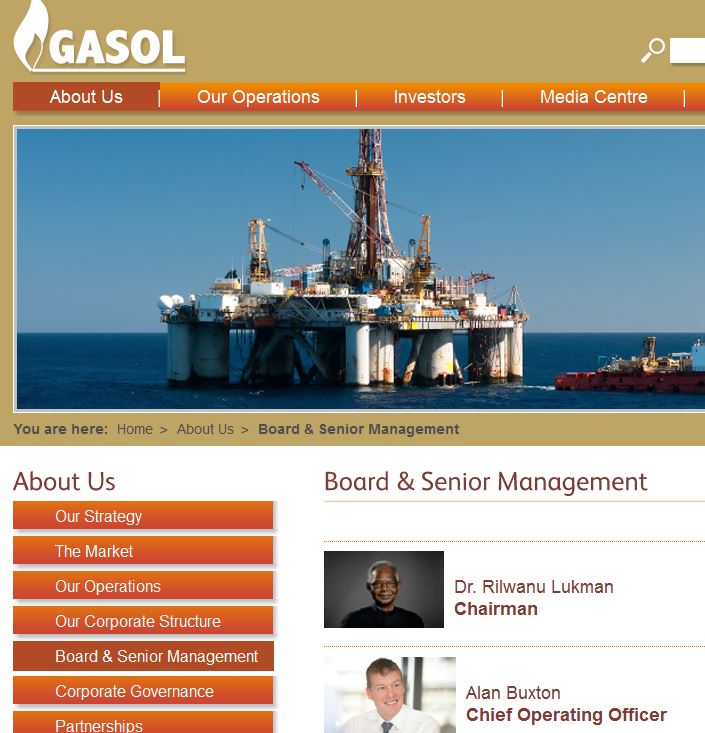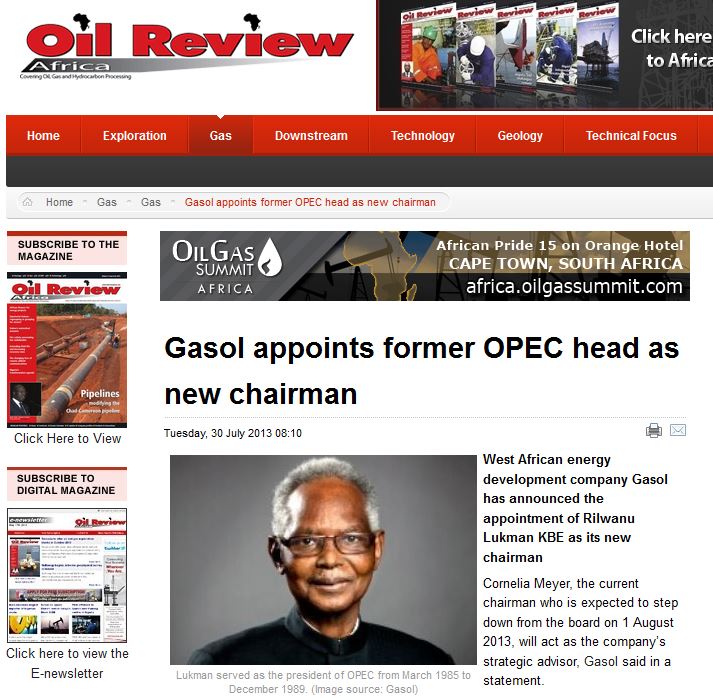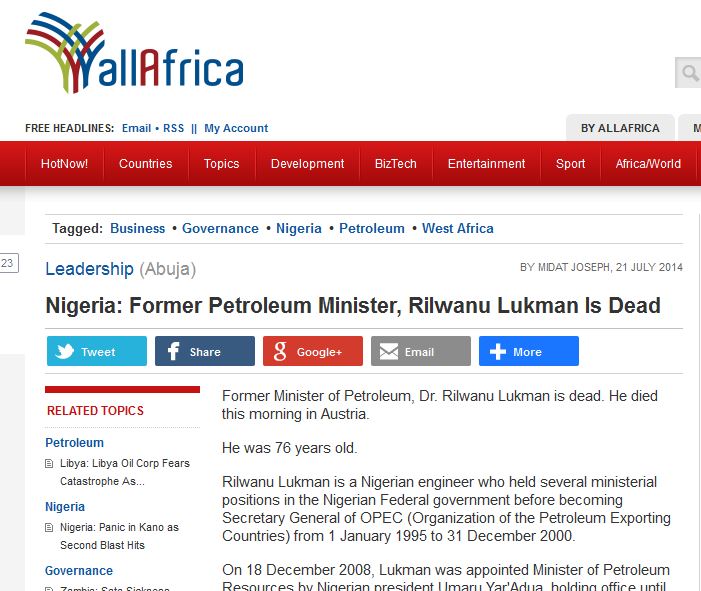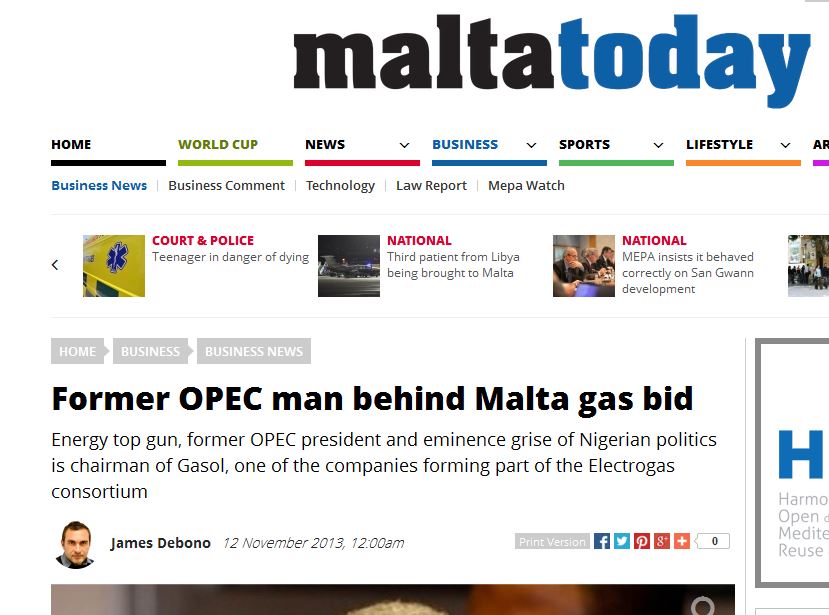Gasol chairman is dead
Gasol chairman Rilwanu Lukman died last Monday in Vienna after what his family said was “a protracted illness”.
Lukman was appointed chairman of Gasol plc in July last year, shortly before it was announced that Gasol would be a lead part of the Electrogas consortium that will build and control Malta’s new gas-fired power station.
His presence at the (non-executive) head of the listed company was made much of by the government-sympathising press in Malta to give weight to the government’s choice of Gasol and to its power station plans.
This same government-sympathising press has now failed to report Lukman’s death, or the fact that his illness was “protracted” which means that he has probably been seriously ill for the duration.
Gasol plc itself has made no announcement on its website. Its ‘latest news’ is currently an announcement of its request for delisting, dated last month.
8 Comments Comment
Leave a Comment






http://www.gasolplc.com/about-us/board-senior-management.aspx
http://www.oilreviewafrica.com/gas/gas/gasol-appoints-new-chairman
http://allafrica.com/stories/201407210829.html
http://www.maltatoday.com.mt/business/business_news/31372/former-opec-man-behind-malta-gas-bid-20131111#.U9Z3M0BW_Cg
http://online.wsj.com/articles/opec-veteran-rilwanu-lukman-dies-1405940730
http://www.gasolplc.com/
So they have to dig at least one hole now for sure.
Brilliant.
Gasol is controlled by African Gas Development Corporation Limited – a private company registered in the Seychelles.
Because the Seychelles is a highly secretive jurisdiction, there are few details online about AGDCL, but this Bloomberg website here carries a few limited details.
http://investing.businessweek.com/research/stocks/private/snapshot.asp?privcapId=31338319
Up to a few weeks ago, this Bloomberg website was listing Dr. Rilwanu Lukman and Mr. Ethelbert JL Cooper as “founders” of AGDCL. See my comment of 27 June here:
http://daphnecaruanagalizia.com/2014/06/gasol-plcs-share-price-has-fallen-by-55-84-over-the-last-year/
When checked last week, it had already been updated and Dr. Lukman’s name had been removed.
This suggests that:
1. Dr. Lukman was probably more than just a “founder.” A founder is a historic fact, and does not change after death. So it is likely that Dr. Lukman was more of a controller of AGDCL: a shareholder, director or legal representative.
2. If the “founders” listed by Bloomberg are controllers of the company, then it is obvious that: (a) AGDCL now has one controller – Mr. Ethelbert JL Cooper, a Liberian – and (b) the control over AGDCL has changed.
Dr. Lukman died on 21 July 2014, the date on which Gasol was delisted from the LSE AIM – this in itself being a strange coincidence.
Away from the public eye, the control over Gasol can change either through its own shareholding or through the control over AGDCL without much public scrutiny.
The Maltese government has a duty to obtain from Gasol and to publish here in Malta information about who controls AGDCL in the Seychelles. In the absence of this information made public, these events can only give rise to speculation.
Like the “speculation” which a relative of Dr. Lukman said exists about the cause of death of Dr. Lukman.
http://sunnewsonline.com/new/?p=73809
That said, everyone knows how China has been raiding the African continent for minerals and resources. Nigeria is Africa’s biggest oil producer. Dr. Lukman served as a Minister of Petroleum Resources in the Nigerian government in 2008-2010, was a founder of the African Petroleum Producers’s Association – an association of African countries that produce oil – and served as Secretary General of OPEC. It is highly unlikely that China, or one of its secret weapons in Africa, have not met with Dr. Lukman at some point in recent years.
Which leaves the question: who is controlling Gasol through AGDCL in the Seychelles?
China did meet with Dr. Lukman on Nigerian oil.
http://www.thefreelibrary.com/Oil+tops+China-Nigeria+talks+agenda-a01612112820
il-kobba tibqa titħabbel.
UPDATE – Gasol unveils new Chinese tie-up for African gas-to-power projects
By Jamie Ashcroft May 01 2014, 4:42pm
http://www.proactiveinvestors.co.uk/companies/news/68127/update-gasol-unveils-new-chinese-tie-up-for-african-gas-to-power-projects-68127.html
CMEC is supplying Malta’s new poer station.
It is of general interest to understand what Gasol is trying to do in the ECOWAS (Economic Community of West African States) area – based on their claims made on their website. Since for many years Gasol has been a cash shell, this raises serious doubts if they are really up to what they claim – simply because they have no past record of any achievements.
ECOWAS includes the neighbouring countries Nigeria, Ghana, Togo, Benin – all of which are at the focus of Gasol’s strategy. There are also Cote’ d’Ivoire, Liberia and Guinea and others. That’s a lot of African countries.
Among those countries, Nigeria is Africa’s biggest oil producer, and critical in Gasol’s stated strategy.
http://www.therichest.com/expensive-lifestyle/location/top-10-oil-producing-countries-in-africa-2013/
Gasol’s focus on Benin, Togo and Ghana is a short-term strategy based on delivering LNG to those countries because they are starved of other fuel resources.
In a ranking by price, oil fuel is more expensive than natural gas delivered in pipelines, while the price of LNG lies somewhere in between. The high cost of oil fuels – especially that experienced over the past decade – has made it difficult for power station companies to invest in new power plants and upgrades in those poor African countries. This has resulted in electricity shortages, high price of electricity and therefore an inability to supply electricity at competitive prices to whole communities in the West of Africa, depriving those nations from balanced development.
While oil fuels were at all time record highs, investments in LNG assets around the world became worthwhile, and those investments have made it possible to capture, liquify, store and transport LNG at economically affordable prices to most destinations, especially those that can be reached by sea-going vessels. The global fleet of LNG tankers has expanded rapidly over the past decade.
As LNG became a cheaper option to oil fuel, new investments were made in new gas power stations. Also, since LNG returned fuel costs to an affordable level, investments in new electricity generation that were previously on hold were now possible, even in the poorer countries.
Meanwhile, over the very long period 1982 to 2009 (27 years), the West African Gas Pipeline Company invested in the construction of a gas pipeline from Nigeria to West African countries, mainly those in ECOWAS.
But what happened was that the quantity of Nigerian production of natural gas fed into the West African Pipeline could not even meet the demand – and the increases over time – for that gas for Nigeria’s own consumption in its towns, cities and communities along the pipeline.
http://www.ft.com/intl/cms/s/0/5b049efc-bb14-11e3-948c-00144feabdc0.html#axzz38nNMNPEi
So the other WA countries did not receive or benefit from the pipeline, and were starved of natural gas.
Hence, Gasol’s stated strategy of bringing in LNG on vessels, storing it on FSRUs or FSUs and, through regasification, feed into the WAP infrastructure to cater for the needs of Benin, Togo and Ghana.
Gasol’s CEO himself says that this is a short term measure, because LNG is more expensive than pipeline gas and in the long run it pays to invest in pipeline systems. Which is why I found it inconsistent for Gasol to argue that its delisting from the LSE AIM was because the financial market was focused on short term returns whereas Gasol was involved in long term projects. Doesn’t make sense to me.
But what is most fascinating in all this, is that this reminds me of John Dalli’s Bahamas saga, where, according to Dalli, he had discussed these “philanthropic projects” in Africa, which would benefit the poor people of Africa.
Meanwhile, Mr. Barry Connor, the owner of the Bahamas villa where Mr. Dalli and his family members had stayed, had told The Times that Mr. Dalli’s meetings involved discussions over fuel efficient engines.
http://www.timesofmalta.com/articles/view/20130706/local/john-dallis-african-adventure.476816
“He also said Mr Connor had offered a trust he owned to serve as a vehicle for the operation, but Mr Connor denied this.
“No, there was no discussion on any project and the discussion on the trust was a way in which he could have control of the trust… I don’t know of any charitable venture. Discussions were had with people who wanted investments in business ventures… he was interested in these business proposals.
“The only reference to Africa I know of was that they were going to promote these products (energy-efficient engines) in Africa.””
And:
““I was introduced to an inventor from the US, for instance, who claimed he had a very fuel-efficient (vehicle) engine, which they could manufacture on a large scale and sell in Africa… there was also a lot of talk about brokering raw African gold and selling it in Europe,” Mr Connor said.”